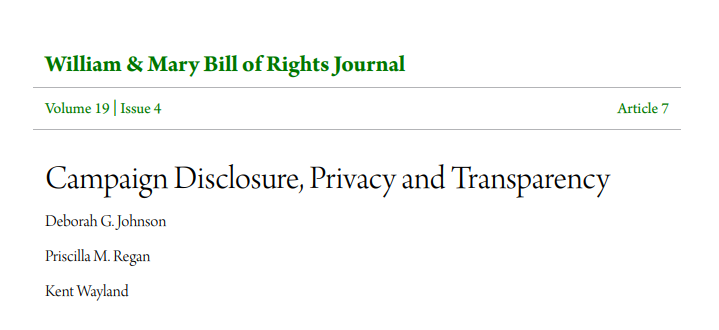In this William & Mary Bill of Rights Journal article, authors Deborah G. Johnson, Priscilla M. Regan, and Kent Wayland explore the trade-off between privacy and transparency in the context of campaign finance disclosure requirements. As the authors’ explain, the policy discussions about balancing or reconciling the importance of public disclosure with the protection of individual privacy focus in large part on the purposes for which the information is likely to be used and the consequences of such uses for the individuals named in the record.
According to the authors, campaign finance disclosure (CFD) is an important domain in which electronic reporting has aggravated the tension between privacy and transparency. As a mechanism of accountability, CFD comes directly into conflict with privacy. On the one hand, because the secret ballot and associational privacy are at stake, there is a strong case to be made for privacy. On the other hand, the privacy interest is often not supported by constitutional or statutory law, and earlier Supreme Court rulings clearly supported the principle that “individual privacy interests can be outweighed by public interests that are served by government collection and use of personally-identifiable data.” CFD is especially important because the secret ballot and associational privacy are not just individual privacy interests, but are public goods essential to democratic governance. In other words, CFD may constitute one of the strongest cases for privacy protection to trump disclosure.
Currently, as the authors conclude, in the context of campaign finance disclosure, posting data does not simply mean making it available to citizens; it means making it available to those who manipulate it and re-post it for a variety of purposes. The authors argue that the reality of information posted on the Internet should be brought together with a new concept of what “public records” should mean. The new concept should take into account the nature of the Internet and the value of privacy alongside the value of transparency.














